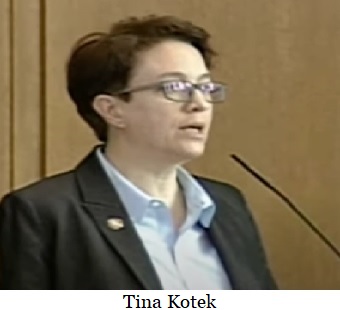There’s a lot of stuff in the pipeline
For weeks, the Oregon House only met 1 day a week to read, debate and vote on bills. However, after a shutdown of the House floor due to a positive COVID-19 case, House Speaker Tina Kotek (D-Portland) decided to kick the legislature into high gear. She began scheduling “daily double†floor session starting March 30th.
On March 30, there were 45 bills scheduled for 2nd reading, setting up the opening of the flood gates. The next day the House was able to move just one bill on a party line vote. Why? The bill voted on was only slightly controversial. It required local governments to allow the conversion of hotels and motels into emergency homeless shelters or affordable housing. While historically it was permissible by local land use planners,
HB 3261, introduced by Representative Pam Marsh (D-Portland), would now require local jurisdiction to allow it.
However, that issue was not the cause of the delay. What brought the House to a crawl was the reading of the next bill,
HB 2111 which was 170 pages long. The Minority party has refused to suspend the rules which requires the reading of each bill, in its entirety, prior to debate and vote. The bill took almost 8 hours to read.
In a
recent article by Representative Bill Post (R-Keizer), he shared the rationale behind the minority request to read the bills in their entirety before a vote. “House Republicans are currently slowing down the Oregon Legislature which is trying to rush passing more than 4,000 wide-ranging bills in a pandemic session. While most bills will have bipartisan consensus like the budget, there are still about 10 percent of the proposals that are partisan, and I believe could make life far worse for Oregoniansâ€.
By April 1, the House had only passed 11 bills including 4 agency budget bills which were moved up the list through bipartisan negotiations. The chamber was also originally scheduled to meet on Good Friday and the Saturday of Easter weekend, but those floor sessions were ultimately canceled by the Speaker of the House possibly as a part of the bipartisan negotiations.
A D V E R T I S E M E N T

A D V E R T I S E M E N T
The House resumed on Monday the 5th with a planned week of “daily double†floor sessions. They quickly managed to whittle off 12 bills from the growing list, but the bills being 2nd read were ever growing and backfilling the 3rd reading list faster than it was being trimmed down. The House continued to meet twice a day through Saturday afternoon trying to shorten the list. However, at the end of the day Saturday, the 3rd reading list posted for Monday contained 50 Bills more than they had two weeks ago.
However, next week the flow of bills out of most of the committees will come to a halt. The calendar dictates that committee bills must be moved out of committee in the original chamber by the end of the day April 13. In addition, the committee chairs from the majority party started canceling committee hearings for next week -- after the 13th -- to clear the calendar for some exceptionally long floor sessions.
Starting Thursday, the House will meet 8 to 10 hours a day just to vote on bills. House Speaker Kotek appears to be determined to clear the list and keep all the bills in the queue moving despite pleas from the Republicans that the focus should be placed on agency budget bills, wildfire relief and COVID-19.
Despite procedural tools use by the minority party such as reading of the bills in their entirety and lengthy floor speeches supporting and opposing bills, there is little the Republicans can do to stop the agenda of the super majority.
--Staff Reports| Post Date: 2021-04-12 10:10:58 | Last Update: 2021-04-12 10:44:11 |







